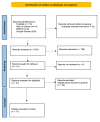A Systematic Review and Meta-Analysis of the Awareness of and Attitudes Toward Epistaxis
- PMID: 37933345
- PMCID: PMC10625789
- DOI: 10.7759/cureus.46590
A Systematic Review and Meta-Analysis of the Awareness of and Attitudes Toward Epistaxis
Abstract
Epistaxis, commonly known as nasal bleeding, ranks among the most prevalent emergencies encountered in otorhinolaryngology. The etiology of epistaxis is multifaceted, arising from both local and systemic factors. In Saudi Arabia, a country with a relatively high prevalence of epistaxis, understanding the level of awareness and attitudes toward first aid management of epistaxis is of paramount importance. This systematic review aims to bridge this knowledge gap by evaluating the awareness of and attitudes toward epistaxis first aid in Saudi Arabia. This systematic review and meta-analysis adhered to Preferred Reporting Items for Systematic Review and Meta-Analysis (PRISMA) guidelines. A comprehensive electronic search was executed across PubMed, Google Scholar, and Web of Science databases, encompassing studies published between January 2015 and July 2023. The study included exclusively cross-sectional studies, assessing awareness and attitude toward epistaxis first aid in Saudi Arabia across all populations and studies in English. The 17 selected studies were all published after October 2017, with three published in the year of this systematic review (2023). Sample sizes exhibited substantial variability, ranging from 57 to 2,441 individuals. Despite widespread awareness of epistaxis, the general population often disregards it as a minor health issue. This discrepancy highlights the importance of addressing epistaxis seriously, given the potential for severe bleeding as a medical emergency. The review of 17 studies revealed significant variations in epistaxis awareness levels, influenced by factors such as age, gender, and varying sample sizes. Notably, higher awareness levels were observed in studies involving the general Saudi population and those employing self-administered questionnaires. The average awareness and knowledge of epistaxis and its management among Saudi residents were moderate, with an estimated awareness level of 63%. A large-scale epidemiological survey, considering sociodemographic factors, is recommended to provide a more comprehensive understanding of epistaxis awareness.
Keywords: attitude; awareness; epistaxis; knowledge; nasal bleeding; nosebleed.
Copyright © 2023, Alkhalifah et al.
Conflict of interest statement
The authors have declared that no competing interests exist.
Figures
References
-
- Update on epistaxis. Douglas R, Wormald PJ. Curr Opin Otolaryngol Head Neck Surg. 2007;15:180–183. - PubMed
-
- Managing epistaxis. Gottlieb M, Long B. Ann Emerg Med. 2023;81:234–240. - PubMed
-
- Demographic, seasonal, and geographic differences in emergency department visits for epistaxis. Chaaban MR, Zhang D, Resto V, Goodwin JS. Otolaryngol Head Neck Surg. 2017;156:81–86. - PubMed
Publication types
LinkOut - more resources
Full Text Sources
Miscellaneous



